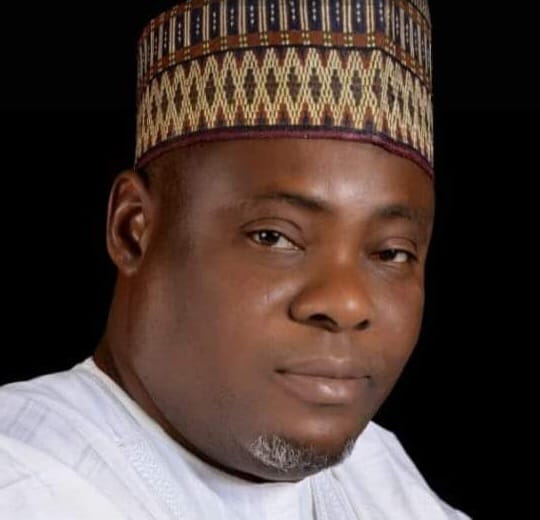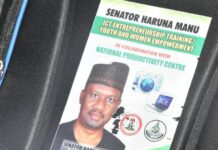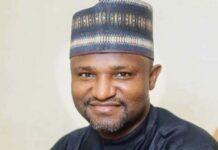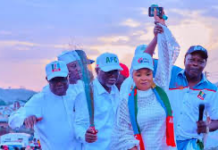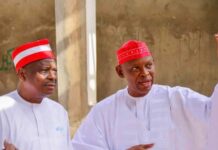Ilorin Emirate: The Culture and Security Challenges By Abdulbaqi Jimoh
The Marxists described culture as a “Social tool and social process”
POLITICS DIGEST- According to Webster dictionary, culture includes the idea, the customs and social behavior of a particular people or society.
Therefore, my conclusion of what culture means, is the general attitude, ethos, dos and don’ts of people including their social, religious, economic and educational endeavors.
What is insecurity?
Oxford dictionary described insecurity as “the state of being subject to danger or injury.”
It is also variously defined as the feeling and positions of uncertainty, “eruption of abnormalities and situation of critical anxieties.”
Evolution of Ilorin as an Emirate
The contemporary Ilorin Emirate evolved as a conglomerate of people united by different cultures powered by the religion of Islam. For instance, we have the yorubas, the nupes, the fulanis, the barubas, the hausas and the malians, all collectively domicile in Ilorin.
History has it that before the advent of Sheikh Alimi of Sokoto caliphacy, there had been trickles of settlers like the hunter “Ojo Isekuse” Afonja and there were other Islamic scholars then as well, such as the Sholagberus.
The advent of sheikh Alimi expanded the scope of Islamic religion and the military prowess of the ancient city. Around the year 1450, the Emirate was established in collaborations with other Mallams.
Oral traditions had it that the Emirate was established with the concept of Islam, communalism, sacrifice and self-denial, i.e. prayers and fasting
For two weeks, they were reported to be in recluse, fasting and praying devotedly and fervently for complete protection of the Emirate, from any invasion, insecurity and known/unknown natural and unnatural disasters. Peace, progress and development inclusive.
What is therefore the culture of Ilorin Emirate?
According to Taylor Francis,” Ilorin culture is rooted in the history of ethnic amalgamation and pluralities. Ilorin became a multi ethnic town with Hausas, Yorubas, Malians, Gobirs, Nupes and Fulani settlers. Ilorin has been known as a city of brave and courageous warriors in history and people known for conquering many towns and kingships in wars.”
According to Ibitola (2017) in History, culture and Tradition of Ilorin people, Nigeria.
“The strong influence of Islam as a religion in Ilorin can be seen in the mode of dressing of most of the inhabitants. The men wear jalabia and a turban around their head, the women favor long dresses and wear scarves or a hijab to cover their heads. This mode of dressing portray them as religious people.”
From these definitions and from the folklore and oral traditions as we have heard, the primary culture of Ilorin Emirate is the culture of Islam, no more, no less.
During our time, very few children will commence primary school without first attending ‘Ile-Kewu’, where he would most likely have completed the knowledge of Quranic recitation. Even while in primary school, we came home to attend afternoon session of ‘ile-kewu’.
This culture foster unity and friendship between the children.
Apart from teaching the Qur’an, pupils were taught the concept of humility, love, peaceful co-existence, morals in general, including respect for elders and respect amongst one another.
Another very strong Islamic culture is that of congregational prayers in the area mosques. Apart from the benefits of praying in congregation, especially the subhi and maghrib/ishai prayers, children were also attracted to the mosques for reasons of meeting their peer groups and for likely ‘oka-saara’ as usually given after maghrib prayers especially on Thursdays. We always looked forward to it.
Remarkably, in these mosques supplications were always made for peace, tranquility for the emirate as symbolized by the Emir and the palace which is always referred to as “Ile Alfa Alimi”.
Economic Culture of the Emirate
The Emirate was renowned for weaving with which quality “aso-oke” were made. We were foremost in pot making with different designs, for cooking, for water preservation, for decoration and floral uses. People of Okelele, Oju Ekun, Eletu, Oke kura, Ita merin, oloje, Abe Emi, used to be the good makers of pottery.
Ilorin used to be active blacksmith with outstanding smithing skills producing exciting rhythms with their bellows as they stoke the fire to heat up the iron. They used to produce hoes, cutlasses, Dane guns, metal buckets, etc. we can find blacksmith spots at Oke-Agbede, Oju-Ekun, Baruba.
The people of Ile-Alawo in Okelelele, Karuma, Oja gboro etc. were very good in leather works.The refined hydes and skins were used for puffs, shoes, decorative items, etc.
The people of Asa and Moro local governments, and parts of Ilorin South and Ilorin East were largely very good farmers and hunters.
Security Challenges of the Emirate
Since Ilorin Emirate is a microcosm of Nigeria as a Nation, whatever challenges the nation has will naturally affect the Emirate. Therefore, the security challenges in Nigeria are being experienced in the Emirate as well.
Topmost in the list of security challenges we have are: Kidnapping, Ritual killings , Yahoo Yahoo and Yahoo-Yahoo, Banditry, Armed robbery, Cultism, Drug and Raping
How can we deploy our culture to curtail and eradicate these malaise?
The most potent solution to the security challenges as listed is our primary culture which we have allowed to ebb away in an alarming rate.
If Islam is the source of our culture, it behoves on us therefore, to revisit the source.
Prophet Muhammad (S.A.W) said, “Prayer is the sword of the Muslims.”
And in another tradition he says,”believe in Allah, but tie your camel.”
Read Also:
The import of these authentic traditions is that there os no problem that Allah can not solve through prayers, but you must as well work towards achieving the aims. That is why those early Mallams prayed and fasted, yet; they raised and trained formidable army for the defense of the Emirate’s territorial integrity and for jihad expeditions.
We have read or heard about how brave, strong and gallant the Ilorin Emirate’s warriors were from different oral traditions, folklore and history.
Wars were won for Prophet Muhammad SAW through prayers followed by actions.
Challenges were solved for other Prophets through prayers .e.g for Prophet Musa against pharaoh for Nuhu who was swallowed by fish, for Yusuf who was thrown in to the well, for Ibrahim who was thrown in to the fire etc.
Let us examine when wars were won for Prophet Muhammad by supernatural elements as testified by Allah (SWT) Himself.
The potency of prayer is taken cognizance of and faithfully believed in, that is why all mosques supplicate for the Emirate after each prayer.
Still in doubt about the potency of prayer?
Remember the “attempted coup” in 1997 and Abacha’s death in 1998
General Abdulkareem Adisa was condemned to be executed but look at the irony of the situation. ( was that a coincidence?)
Remember the major Gideon Orka coup In April 22 1990 and General Wahab Ayodeji Giwa’s purported involvement ?He was not only discharged and acquitted he was reinstated and eventually became a General Officer Commanding before he voluntarily and successfully retired from the Nigerian Army. (still a coincidence?)
Remember the attempted invasion of the “Agbekoya” in to Ilorin and their total crushing at Gamo some years ago?(a coincidence too?)
Remember the outrage of Sunday Igboho and his insultive languages against Ilorin people and the Emir in particular during his self aggrandizements and Yoruba self determination campaign ?
Remember his inevitable waterloo weeks after in cotonou Republic of Benin. Too many coincidences or the power of prayers as firmly planted and rooted in the Emirate. However, we need to nurture and faithfully water the product for sustenance and regeneration.
We must therefore revive the culture of prayers.
IEDPU should be mandated to discuss the issue of raising a trusted and pious prayer warriors, who can perform something akin to the Oke Suna prayer for the fortification of Ilorin Emirate in particular, and the state/Nigeria in general. This should not be a one off affair, probably once in a decade or even annually.
We, the so called elite have abandoned the culture of communal existence, we have embraced Eurocentric concept of individualism. We have left our different family houses, to the extent that in some cases, the outsiders come to rent rooms in our family houses. This is totally condemnable and outrageous.
Also, most of the ‘ile-kewus’ are no more in existence, and where they do, parents are lackadaisical about attendance or non attendance of their wards and children.
Area mosques are no more as vibrant as they used to be, and the usual supplication for the Emirate has withered.
The benefits of these three institutions, i.e, family house, ile-kewu, and the mosque, are lost to our children.
The fraternal and communal relationship amongst children keep them at bay from waywardness. Parents know the friends of their children. Misbehavior of children were corrected by ANY elder not only in the compound but in the area.
The morals and Islamic ethics taught in Ile-kewu are no more.
Having taken care of the primary culture of Islam, let us examine how we can deploy our socio-economic culture to resolve the security challenges.
As enumerated earlier, we have WEAVING, POTTERY, BLACK SMITHING, LEATHER WORKS, FARMING/HUNTING and COMMERCE.
As we have known, abject poverty is one of the foremost reasons for insecurity. As commonly acknowledged, idle hands are the workshop for the devil.
The Emirate is blessed with economically viable culture, but because everybody prefers white-collar jobs, our traditional economic ventures were repudiated by our youth. Nobody wants to be an “abawu” (weaver) pottery is considered local, tying and dyeing is demeaning, blacksmithing is not prestigious, leather works is obsolete, farming is tedious, hunting is not profitable, etc.
People forget that from the womb of yesterday, today is born. From the sweat of the proletariats, the town edifices were constructed. And from the black pot comes out the white pap.
The entrepreneurial skills of our forefathers should not be completely thrown overboard as being local or as not befitting. They should rather be improved upon.
(The history of slave trade, industrial revolution, I.T evolution and robotic science suffice)
After all, it is with these endeavours that we were trained. If our parents could patiently and frugally expend the proceeds of these products to educate us, we should use our education to improve upon their legacies.
If pots of different sizes were exported to the south-south in the early 70’s to Edo state specifically, if our Aso Oke were exported to Ibadan to be purchased by different parts of the country 40years ago, and our leather works exported to the North . We could expand the scope and develop the trade in collaboration with the government.
If our youth are encouraged to farm, this in collaboration with the local government, our youth will realise that truly, there is dignity in labour.
The time is now, when we should all stand up and draw a blue print for the implementation of different solutions offered in different fora for the eradication of the insecurity biting hard into the social fabrics of our great ancient Ilorin Emirate, its environs and the state in general.
Being a lecture delivered by Mallam Abdulbaqi Jimoh at the 5th Ilorin Likeminds Foundation Annual General Meeting and Dinner on the 11th July 2022

